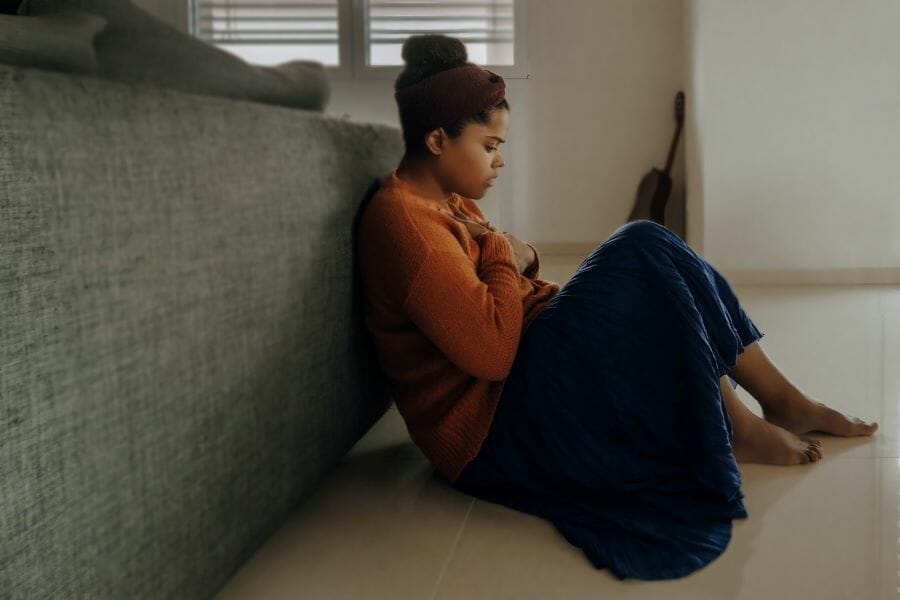Seasonal Affective Disorder Self-Care: Tips to Beat The Winter Blues & Thrive
The cold weather and holiday season can take a toll on your mental health—but you don’t have to suffer through the winter months! For many, this time of year brings shorter days, less sunlight, and colder temperatures, which can lead to feelings of sadness, fatigue, and loneliness. If you often feel this way, you may be experiencing seasonal affective disorder (SAD), commonly referred to as winter blues or seasonal depression.
In this blog post, we’ll learn what SAD is, explore symptoms of SAD, and provide actionable self-care strategies for seasonal affective disorder to help you thrive this winter.

What Is Seasonal Affective Disorder?
Seasonal affective disorder (SAD) is a form of depression that occurs at the same time every year, most often during the fall and winter. People living in regions with less sunlight and shorter days are more likely to experience SAD. It’s estimated that women are four times more likely to be affected than men.
The lack of daylight during these months can disrupt your circadian rhythm, decrease your Vitamin D levels, and increase melatonin production—leading to feelings of fatigue, low energy, and difficulty concentrating. These hormonal changes can have a big impact on your mood and mental health.
Common Symptoms of Seasonal Affective Disorder
Do these symptoms sound familiar?
- Persistent sadness or low mood.
- Loss of interest in activities you usually enjoy.
- Difficulty concentrating or staying productive.
- Fatigue or lack of energy, even after sleep.
- Increased cravings for carbohydrates and weight gain.
- Social withdrawal or feelings of isolation.
- Sleep disturbances, such as sleeping too much or too little.
If you’re nodding along, you’re not alone—but the good news is there are effective self-care strategies for seasonal affective disorder that can help you feel better.
Seasonal Affective Disorder Self-Care Strategies
Taking care of your mental health during the winter months doesn’t have to be overwhelming. Here are some practical and effective SAD self-care tips to help you navigate the season:
1. Light Therapy
One of the most effective treatments for SAD is light therapy. This involves sitting in front of a lightbox that mimics natural sunlight for 30 minutes to an hour each morning. Light therapy can help regulate your body’s internal clock, boost your energy levels, and improve your mood.
What to Look For:
- A light therapy box with 10,000 LUX intensity.
- Products designed to filter out harmful UV rays.
Tip: Speak with your healthcare provider before starting light therapy, especially if you have any preexisting eye or skin conditions.
2. Nourish Your Body with the Right Foods
What you eat can have a significant impact on your mood and energy levels. Focus on a diet rich in:
- Omega-3 Fatty Acids: Found in salmon, walnuts, chia seeds, and flaxseed, omega-3s can help stabilize your mood.
- Magnesium: Essential for hormone balance, magnesium is abundant in spinach, dark leafy greens, and whole grains.
- L-Lysine: Believed to reduce cortisol (stress hormone), it’s found in red meat, fish, and cheese.
Tip: Minimize alcohol, caffeine, and sugar, as these can disrupt sleep and mood regulation. The Matrescence App includes nutrition tips to support you mental and emotional help and our favorite Salmon recipe, start your free trial today!

3. Stay Active and Get Outside
Even a short walk outside can make a difference. Exposure to natural sunlight—even on cloudy days—can improve your mood and reset your circadian rhythm.
- Exercise Regularly: Physical activities like yoga, jogging, or even dancing release endorphins that naturally boost your mood.
- Combine Fresh Air with Movement: Take your workout outside when possible, whether it’s a brisk walk or a fun activity like sledding with your kids.
4. Prioritize Relationships
Staying connected with others is so important for your mental health—especially during the colder, darker winter months.
- Spend time with friends and family to combat feelings of loneliness.
- Can’t meet in person? Join an online mom group to connect with other moms navigating similar challenges.
5. Practice Mindfulness and Track Your Mood
Mindfulness practices like meditation and breathwork can help reduce stress and promote emotional balance.
Benefits of Mindfulness:
- Decreases cortisol levels (stress hormone).
- Improves relationships by fostering patience and positivity.
- Helps you handle tough moments—like those “mom rage” moments—with grace.
Tip: Use a mood tracker to monitor patterns, identify triggers, and gain insight into what works best for your mental health. Try our app for easy mood tracking and personalized suggestions—start your free trial today!
6. Optimize Your Sleep
Good sleep hygiene is essential for managing SAD symptoms.
- Stick to a Consistent Sleep Schedule: Go to bed and wake up at the same time every day. If you have a newborn, our guide to Restful Sleep in Motherhood can help you get those much needed zzz’s.
- Create a Sleep-Friendly Environment: Dim the lights, avoid screens before bed, and make your bedroom cozy and clutter-free.
Tip: Download our free guide: 5 Tips to Help You Sleep and Reduce Your Anxiety.

7. Seek Professional Support
Sometimes, seasonal affective disorder self-care isn’t enough on its own. Speaking to a mental health professional can provide deeper support and guidance.
BetterHelp offers accessible, affordable therapy with licensed professionals. Whether through chat, phone, or video sessions, you can get the support you need from the comfort of your home.
Exclusive Offer: Use code THEMATRESCENCE for 15% off your first month! As a BetterHelp affiliate, we may receive compensation from BetterHelp if you purchase products or services through the links provided.
Final Thoughts: You Can Thrive This Winter
The winter months can be challenging, but with the right seasonal affective disorder self-care strategies, you can protect your mental health and find joy in the season. Whether it’s light therapy, nourishing foods, exercise, or mindfulness, small steps can lead to big changes.
Your next step: Start your free trial of our app and gain access to resources that support all these strategies and more. Explore guided meditations, our comprehensive magnesium guide, mood-boosting recipes, and practical tools to help you thrive—even on the darkest days.
Start your free app trial today and start prioritizing your well-being this winter!







